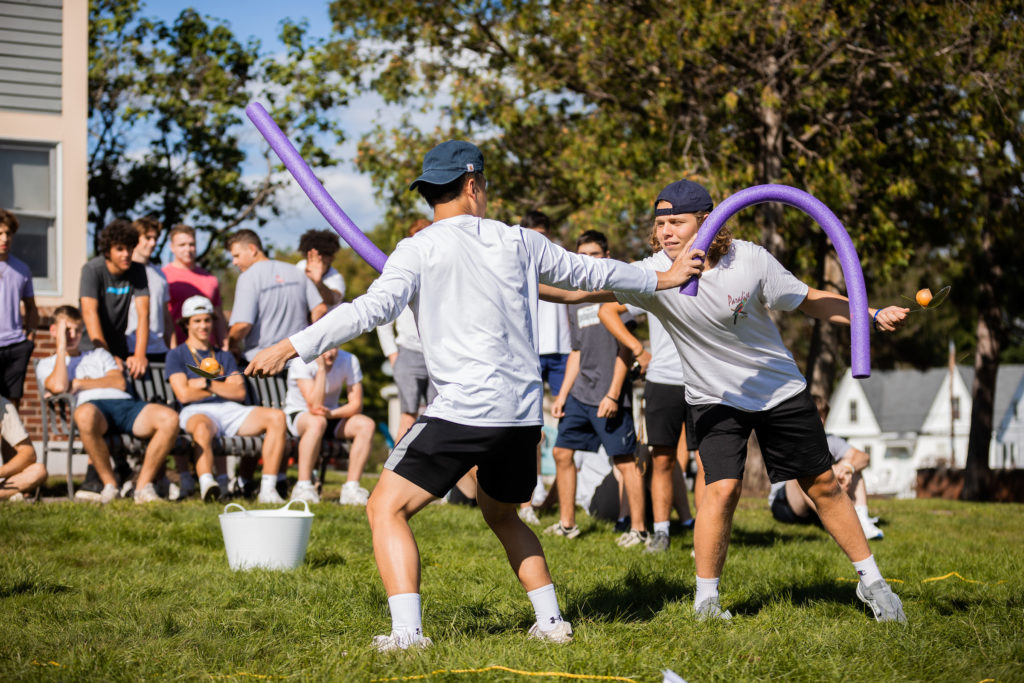
At Tilton, everything we do is guided by our essential skills. In considering these skills of inquiry, communication, mindfulness, creativity, and play, one might naturally see the connections and how these skills manifest in the classroom.
Inquiry is the way in which we encourage students to learn through questions rather than direct instruction. The skill of communication, in writing, in collaborating, and in presentation, are critical to develop. Mastery learning emphasizes the value of mindfulness in using assessment
to improve our knowledge, rather than simply to determine a grade. Creativity in our writing, our design of projects, and the arts also develops the academic growth of our students. When considering play, however, it might cause a slight pause in identifying where exactly this essential skill would fit into our academic program. What is academic play, and why is this essential skill so very important to our Mastery Approach of learning?
Certainly we can consider the value of play in several facets of our life together. On the athletic fields, courts, and rink, play is an essential part of Tilton. We use play in athletics to develop physical well- being, mental fortitude, collaboration, and work ethic. Through athletics, students also try new things, and learn about pushing their limits in healthy ways. Play also is seen in our community life. Whether during a school meeting with the Black and Gold team games every week, or weekend activities that bring students together for fun, play is easily seen as a distinguishing characteristic of our life together. With the increase in stress and anxiety of adolescents, it is crucial that we give our students opportunities to de-stress, be together, and have fun. Play gives our students freedom, joy, and time to just be.
With a little thought, we can see how these skills translate into the classroom. Already, it is well known that play is an essential pathway for learning in earlier years of education. Maria Montessori, for whom the Montessori educational philosophy is named, described play as “the work of the child.” Play gives children the opportunity to explore, create, solve problems, and collaborate while advocating for personal needs. Without excessive structure, play allows children to develop the foundation of those skills that we hold dear at Tilton. Project Zero, a Harvard-based educational research center, has recently extended its research on the “Pedagogy of Play” to middle and high school environments. So many of the learning principles that are developed through play during early education evolve in high school learning, and in fact serve as natural bridges to both successful Tilton learning, and the skills we hope our graduates will take with them into their adulthood. In addition to developing a mindset of curiosity, play enables our students to be independent, make decisions, take ownership of their learning, and have the opportunity to demonstrate their competency through performance and evidence. Perhaps most importantly, play is an opportunity to create equitable learning environments in which each learner uses their experience and perspective to create meaning that is relevant to both the problem they are solving, and their personal growth.
So, what does academic play look like at Tilton? Computer Science students learn the fundamentals of coding following a college preparatory curriculum. With this background, they use the language of Python to solve tasks independently. Each challenge has several possible solutions, and the workable code is determined through creation, evaluation, and reassessment. Because there is no one right answer, students have to play with their code to create effective programs and sustainable models.
In 10th grade English classes, the elements of play are seen in a slightly different manner. As they studied Mary Shelley’s classic Frankenstein, students created and evaluated criminal portfolios for the characters. Emphasizing attention to detail and character analysis, these projects bridged the gap between classical analysis of literary text, and developing a personal meaning. Students were able to bring their own perspective and story and connect it to text without the constraints of an expected “right” answer, developing a richer understanding.
Finally, Entrepreneurship students recently applied marketing, investment strategies, and inventory management by creating and implementing individual pop-up businesses. After students identified the product they thought would best serve the needs of their peers, they filled the halls with various markets to hawk their products. Through healthy competition with each other, students were able to challenge themselves to not only sell for quantity, but also for value to our community.
It is hard to imagine a better way to ask our students and faculty to learn together and to learn from each other; as we play, we learn, we grow, and we laugh. This process is at the core of what we do at Tilton. We are bold to not just acknowledge, but embrace play as an essential part of teaching and learning.